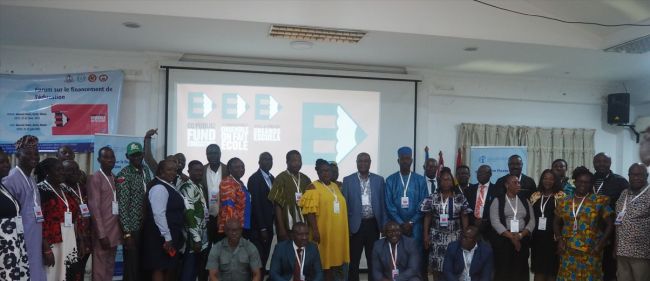L'IE Afrique lance la campagne 'La force du public : ensemble on fait école’ à Accra
L'Internationale de l'Éducation (IE) et ses organisations membres au Ghana ont organisé un atelier à l'hôtel Mensvic à Accra le 21 juin 2023 pour discuter du financement de l'éducation. Les organisations membres de l'IE du Sénégal et de la Zambie impliquées dans le projet d'Alliance Taxe et Education (TaxEd) ont rejoint leurs homologues du Ghana et du Nigéria impliqués dans la campagne de la Réponse Mondiale contre la Privatisation et la Commercialisation de l'Education et dans l'Education. Les deux initiatives ont convergé pour renforcer la campagne de l'IE "La force du public:ensemble on fait école !" lancée le 24 janvier 2023.
L'atelier, qui a réuni plus de 40 participants, s'est concentré sur l'examen des engagements des gouvernements africains en matière d'éducation. Ces engagements, tels que cités par le Directeur de l'IE Afrique, le Dr Sinyolo Dennis, incluent "assurer une éducation inclusive et équitable de qualité et promouvoir les possibilités d'apprentissage tout au long de la vie pour tous", comme le stipule l'Objectif de Développement Durable (ODD) 4 des Nations Unies.
Il a également fait référence aux engagements mondiaux concernant les enseignants, comme indiqué dans la cible 4.C de l'ODD, qui exige une augmentation substantielle du nombre d'enseignants qualifiés, ainsi que dans la Déclaration d'Incheon et le Cadre d'action Éducation 2030, qui s'engagent à faire en sorte que les enseignant.e.s et les éducateur.rice.s "soient habilité.e.s, recruté.e.s de manière adéquate, bien formé.e.s, qualifié.e.s professionnellement, motivé.e.s et soutenu.e.s dans le cadre d'une gouvernance efficace, dotée de ressources suffisantes et effective". Les gouvernements africains ont également pris des engagements régionaux dans le cadre de la Stratégie Continentale de l'Education pour l'Afrique (CESA), a-t-il ajouté.
Dr. Sinyolo a expliqué que les progrès vers la réalisation de ces engagements ont été entravés par l'insuffisance des investissements dans l'éducation, le manque d'enseignant.e.s et le manque d'infrastructures et de ressources d'enseignement et d'apprentissage. À la lumière de ces obstacles, il a révélé que les gouvernements n'investissent pas assez d'argent dans l'éducation et les enseignant.e.s. En moyenne, les pays africains investissent 3,8 milliards d'euros dans l'éducation et les enseignants. En moyenne, les pays africains investissent 3,8 % de leur PIB dans l'éducation, au lieu de 6 %, et des pays comme le Ghana et la Zambie ont investi respectivement 12,9 % et 13,9 % du budget national, au lieu des 20 % minimums requis pour le financement de l'éducation.
C'est dans ce contexte que la campagne "La force du public:ensemble on fait école !'' a été lancée pour faire pression sur les gouvernements afin qu'ils mobilisent davantage de fonds pour l'éducation publique, sous l'impulsion des enseignant.e.s et de la société civile. Les syndicats et les gouvernements devraient faire pression non seulement pour obtenir une part équitable du budget de l'éducation, mais aussi pour veiller à ce que les gouvernements réalisent des budgets plus importants.
Nii Addo, du Réseau pour la justice fiscale, a démontré, dans sa présentation intitulée "Augmenter le financement de l'éducation grâce à une fiscalité équitable et progressive", que les gouvernements doivent combler les lacunes fiscales telles que les exonérations et les congés fiscaux, la fraude fiscale et l'évasion fiscale afin de générer plus d'argent pour l'éducation. "Les gouvernements doivent également lutter contre la corruption s'ils veulent obtenir plus de financement pour l'éducation", a-t-il souligné.
Kofi Asare, de Africa Education Watch, a présenté les implications des emprunts des gouvernements auprès du Fonds Monétaire International (FMI) sur l'éducation. Il a souligné que les emprunts auprès du FMI peuvent affecter l'éducation car les prêts sont accompagnés de conditionnalités qui peuvent influencer massivement le financement consacré à l'éducation et aux enseignants. Il a conseillé aux pays de ne pas mener de politiques d'austérité, en réduisant les dépenses publiques sur des aspects vitaux de l'éducation. Une présentation du Dr Pedi Anawi a également révélé que les plafonds de la masse salariale imposés par le FMI et la Banque Mondiale avaient un impact négatif sur l'éducation, les performances et le bien-être des enseignant.e.s et des travailleurs.euses de l'éducation.
A la fin de l'atelier, les participants ont adopté la déclaration de l'IE Afrique sur le Financement de l'Education pour l'événement public du 22 juin, disponible ici.

[Mon, 26 Jun 2023 10:33:00 +0000] | DIGG THIS
Internationale de l’Education · No. 3 Torshie Close, Mempeasem · East Legon Extension · Accra · Ghana
Phone: +233.302.50.12.00 · Fax: +233.302.50.66.81 · Email: eirafoffice@ei-ie.org
Website Development and Design by Cyblance
